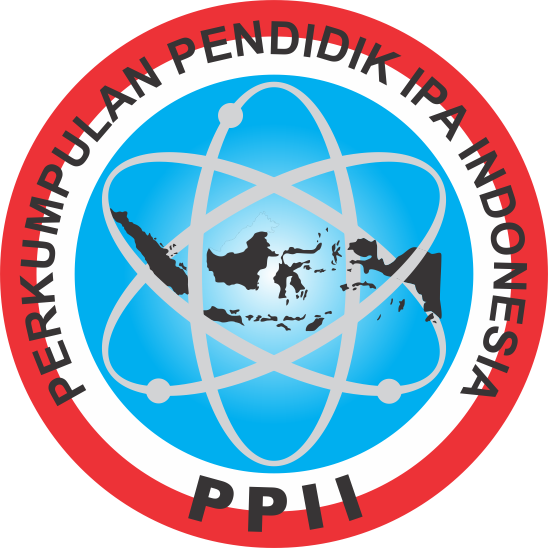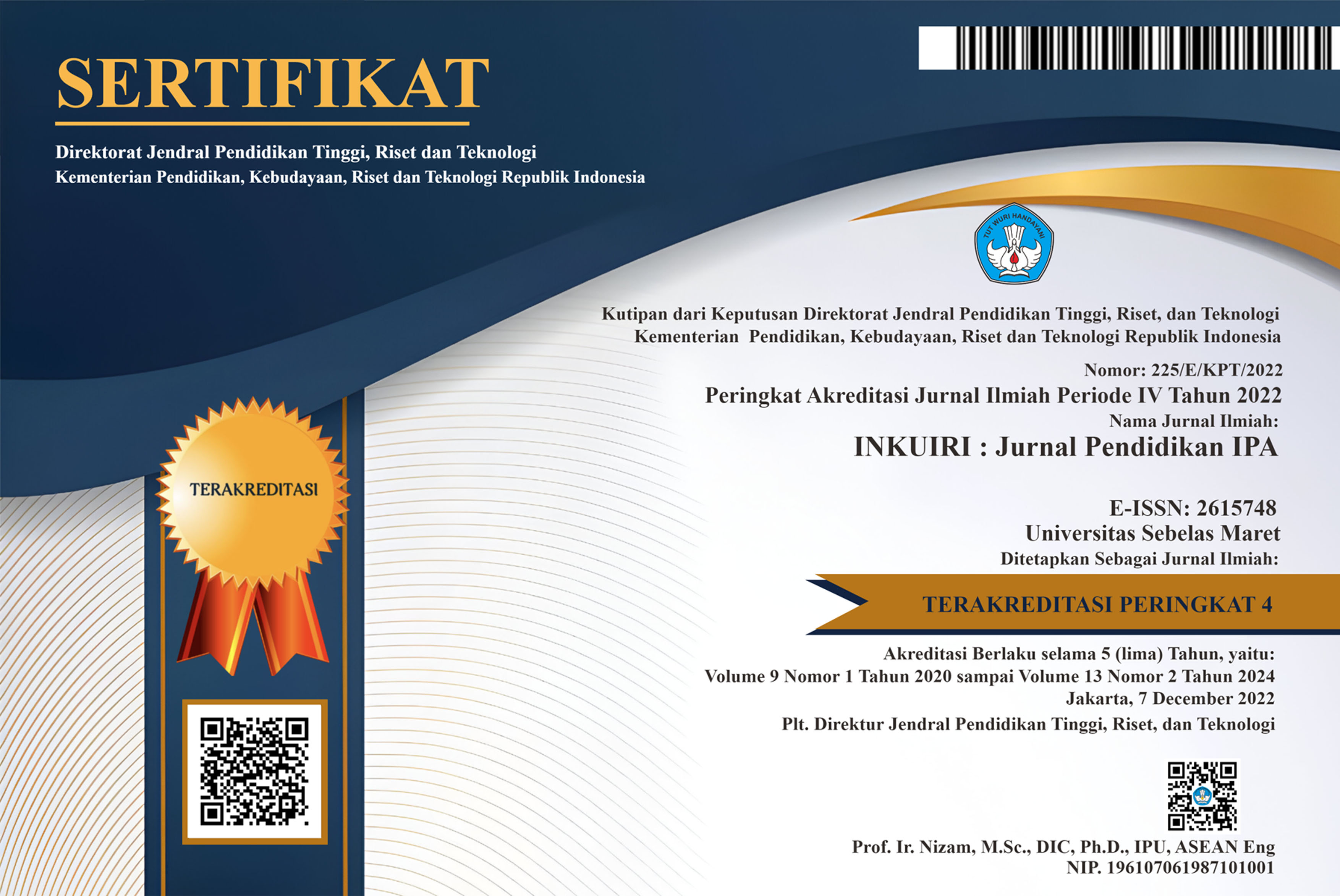HASIL BELAJAR KOGNITIF DALAM CONTROL VARIABLE STRATEGY (CVS) BERBANTUAN BAHAN AJAR SAINTIFIK
Abstract
Control Variable Strategy (CVS) merupakan metode yang digunakan untuk mengerjakan, mendesain kegiatan eksperimen sehingga diperoleh hasil yang valid dan interpretasi yang mudah dipahami. CVS digunakan dalam kegiatan eksperimen di pembelajaran IPA untuk mempermudah peserta didik melakukan investigasi. Bahan ajar saintifik merupakan perpaduan antara bahan ajar dan LKPD sebagai satu sumber belajar yang digunakan untuk mempermudah penerapan CVS. Tujuan penelitian ini untuk mengetahui pengaruh CVS berbahan ajar saintifik terhadap hasil belajar kognitif. Metode penelitian dalam penelitian ini yaitu metode kuantitatif. Penelitian ini dilakukan di kelas VII SMP PGRI 1 Ajibarang. Desain penelitian yang digunakan adalah quasy experimental study with kontrol group design. Data hasil belajar kognitif dianalisis dengan uji regresi, koefisien determinasi, N-Gain Test, dan T-Test. Hasil penelitian dengan uji regresi dan koefisien determinasi menunjukkan nilai signifikansi 0.000 < 0.05 sehingga CVS berbahan ajar saintifik berpengaruh terhadap hasil belajar kognitif sebesar 41,7%. Hasil N-Gain Test menunjukan besarnya peningkatan hasil belajar kognitif kelompok eksperimen lebih besar dibandingkan kelompok control. Hasil T-Test menunjukkan nilai signifikansi sebesar diperoleh nilai signifikansi 0.000 < 0.05, berarti ada perbedaan antara rata-rata hasil belajar kognitif pada kelompok eksperimen dan kelompok kontrol. Simpulan pada penelitian ini yaitu CVS berbahan ajar saintifik berpengaruh terhadap hasil belajar kognitif. Implikasi penelitian ini yaitu CVS berbahan ajar saintifik dapat diterapkan oleh guru dalam membimbing peserta didik mendesain dan mengerjakan eksperimen yang dikontrol sehingga hasil belajar kognitif peserta didik mengalami peningkatan.
Control Variable Strategy (CVS) is a method used to work on, design experimental activities so that valid results and interpretations are easy to understand. CVS is used in experimental activities in science learning to make it easier for students to investigate. Scientific teaching materials are a combination of teaching materials and LKPD as a learning resource that is used to facilitate the implementation of CVS. The purpose of this study was to determine the effect of CVS based on scientific teaching on cognitive learning outcomes. The research method in this research is quantitative method. This research was conducted in class VII SMP PGRI 1 Ajibarang. The research design used was a quasi experimental study with a control group design. Cognitive learning outcomes data were analyzed by regression test, coefficient of determination, N-Gain Test, and T-Test. The results of the study using regression tests and the coefficient of determination showed a significance value of 0.000 <0.05 so that CVS with scientific teaching materials had an effect on cognitive learning outcomes of 41.7%. The results of the N-Gain Test showed the magnitude of the increase in cognitive learning outcomes in the experimental group was greater than the control group. The results of the T-Test showed a significance value of 0.000 <0.05, meaning that there was a difference between the average cognitive learning outcomes in the experimental group and the control group. The conclusion in this study is that CVS with scientific teaching materials has an effect on cognitive learning outcomes. The implication of this research is that scientific teaching materials CVS can be applied by teachers in guiding students to design and work on controlled experiments so that students' cognitive learning outcomes increase.
Keywords
Full Text:
PDFReferences
Astuti, W., & Kristin, F. (2017). Penerapan Model Pembelajaran Teams Games Tournament Untuk Meningkatkan Keaktifan dan Hasil Belajar IPA. Jurnal Ilmiah Sekolah Dasar, 1(3), 155-162.
Chen, Z., & Klahr, D. (1999). All Other Things Being Equal: Acquisition and Transfer of the Control ofVariables Strategy. Child Development, 70(5), 1098–1120.
Cooper, M. M., Sandi–Urena, S., & Stevens, R. (2008). Reliable Multi Method Assessment of Metacognition Use in Chemistry Problem Solving. Chemistry Education Research and Practice, 9(1), 18-24.
Diba, P. F., Wardani, S., & Sudarmin, S. (2017). Pengembangan Lembar Kerja Siswa Materi Kelarutan dan Hasil Kali Kelarutan Berbasis Inkuiri untuk Meningkatkan Keterampilan Generik Sains Siswa. Journal of Innovative Science Education, 6(1), 1-8.
Efendi, N. (2013). Pengaruh Pembelajaran Reciprocal Teaching Dipadukan Think Pair Share terhadap Peningkatan Kemampuan Metakognitif Belajar Biologi Siswa SMA Berkemampuan Akademik Berbeda di Kabupaten Sidoarjo. Jurnal Santiaji Pendidikan (JSP), 3(2), 85-109.
Erina, R., & Kuswanto, H. (2015). Pengaruh model pembelajaran instad terhadap keterampilan proses sains dan hasil belajar kognitif fisika di SMA. Jurnal Inovasi Pendidikan IPA, 1(2), 202-211.
Harahap, N. (2013). Penerapan Model Pembelajaran Kooperatif Tipe STAD Terhadap Hasil Belajar Kognitif, Motivasi dan Aktivitas Belajar Siswa pada Konsep Ekosistem di MTsN Model Banda Aceh. Visipena Journal, 4(2).
Harmelen, E. (2017). Combining direct instruction on the Control-of-Variables strategy with task segmentation: is there a positive synergistic effect? (Master's thesis, University of Twente).
Hmelo-Silver, C. E., Duncan, R. G., & Chinn, C. A. (2007). Scaffolding and achievement in problem-based and inquiry learning: a response to Kirschner, Sweller, and. Educational psychologist, 42(2), 99107.
Kuhn, D., & Dean, D. (2005). Is developing scientific thinking all about controlling variables? Psychological Science, 16, 866–870.
Kuhn, D., Amsel, E., & O’Loughlin, M. (1988). The development of scientific thinking. San Diego, CA: Academic Press.
Lazonder, A. W., & Egberink, A. (2014). Children’s Acquisition and Use of the Control -of-Variables Strategy: Effects of Explicit and Implicit Instructional Guidance. Instructional Science, 42(2), 291-304.
Lazonder, A. W., & Harmsen, R. (2016). Meta-analysis of inquiry-based learning: Effects of guidance. Review of educational research, 86(3), 681-718.
Lee, C. B., Teo, T., & Bergin, D. (2009). Children’s Use of Metacognition in Solving Everyday Problems: An Initial Study from an Asian Context. The Australian Educational Researcher, 36(3), 89-102.
Lorch Jr, R. F., Lorch, E. P., Calderhead, W. J., Dunlap, E. E., Hodell, E. C., & Freer, B. D. (2010). Learning the control of variables strategy in higher and lower achieving classrooms: Contributions of explicit instruction and experimentation. Journal of Educational Psychology, 102(1), 90.
Maysyarah, H., Subali, B., & Paidi, P. (2018). Aktualisasi Pembelajaran Metode Ilmiah dalam Mata Pelajaran Biologi SMAN Bantul dan Sleman. Pend. Biologi-S1, 7(2), 114-121.
Mustami, M. K., & Irwansyah, M. (2015). Pengembangan Lembar Kerja Peserta Didik (LKPD) Berorientasi Pendekatan Saintifik pada Mata Pelajaran Biologi di SMA. Lentera Pendidikan: Jurnal Ilmu Tarbiyah dan Keguruan, 18(2), 236-247.
Mustika, M., Saptaningrum, E., & Susilawati, S. (2016). Pengaruh Penggunaan LKS dengan Pendekatan Saintifik pada Materi Objek IPA dan Pengamatannya terhadap Hasil Belajar IPA Kelas VII MTs Negeri 1 Semarang. Jurnal Penelitian Pembelajaran Fisika, 7(1), 63-71.
Nugraha, E. A., Yulianti, D., & Khanafiyah, S. (2012). Pembuatan Bahan Ajar Komik Sains Inkuiri Materi Benda untuk Mengembangkan Karakter Siswa Kelas IV SD. UPEJ Unnes Physics Education Journal, 1(2).
Sari, D. Y. K., Wahyuni, S., & Supriyadi, B. (2016). Pengembangan Modul Pembelajaran IPA Berbasis Salingtemas (Sains, Lingkungan, Teknologi, Masyarakat) di SMP. Jurnal Pembelajaran Fisika, 5(3), 218-225.
Schalk, L., Edelsbrunner, P. A., Deiglmayr, A., Schumacher, R., & Stern, E. (2019). Improved Application of the Control-of-Variables Strategy as A Collateral Benefit of Inquiry-Based Physics Education in Elementary School. Learning and Instruction, 59(1), 34-45.
Schraw, G., & Dennison, R. S. (1994). Assessing Metacognitive Awareness . Contemporary Educational Psychology, 19(4),:460-475.
Setiyadi, M. W. (2017). Pengembangan Modul Pembelajaran Biologi Berbasis Pendekatan Saintifik untuk Meningkatkan Hasil Belajar Siswa. Journal of Educational Science and Technology (EST), 3(2), 102-112.
Sugiyono. (2012). Metode Penelitian Pendidikan Pendekatan Kuantitatif, Kualitatif dan R & D. Bandung: Alfabeta.
Tyas, M. W., & Wahyuni, S. (2015). Pengembangan Bahan Ajar IPA Berupa Komik Edukasi pada Pokok Bahasan Objek IPA dan Pengamatannya di SMP. Jurnal Pembelajaran Fisika, 4(1), 32-37.
U.S. Department of Education, Institute of Education Sciences. (2012). Creview of The Report: Learning The Control of Variables Strategy in Higher and Lower Achieving Classrooms: Contributions of Explicit Instruction and Experimentation. http://whatworks.ed.gov (diunduh tanggal 4 Januari 2019).
Umbaryati, U. (2016). Pentingnya LKPD pada Pendekatan Scientific Pembelajaran Matematika . PRISMA, Prosiding Seminar Nasional Matematika (pp. 217-225).
Zahid, Gulnaz. (2015). Globalization, nationalization and rationalization. Procedia -Social and Behavioral Sciences. 1(174): 109 – 114.
Refbacks
- There are currently no refbacks.






